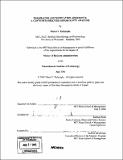Pharmacies and medication adherence : a customer-oriented opportunity analysis
Author(s)
Kalayoglu, Murat Veysel
DownloadFull printable version (3.287Mb)
Other Contributors
Sloan School of Management.
Advisor
Barbara Bund.
Terms of use
Metadata
Show full item recordAbstract
Medication non-adherence is one of the most costly and difficult problems in healthcare today. In the United States alone, half of the 3.5 billion prescriptions dispensed are not taken as prescribed, costing our healthcare system an estimated $100 billion. Ten percent of all hospitalizations and 125,000 deaths each year are attributable directly to non-adherence to medicines. Medication non-adherence is a complex, multi-faceted problem and potential ways to increase adherence to medications traditionally have focused on the physician - patient relationship. However, medication dispensing requires an additional interaction between the pharmacy and patient, and properly-incentivized pharmacies employing unique adherence programs may be capable of enhancing adherence above and beyond existing methods. This thesis explores how traditional chain and independent drugstore pharmacies 1) prioritize medication adherence; and 2) may benefit from instituting medication adherence programs. The hypothesis tested was that pharmacies would benefit substantially from instituting adherence programs. (cont.) Data from interviews, company financials and industry reports were used to quantify a value proposition for the drugstore pharmacy. Interviews revealed a strong disconnect in emphasis placed on medication adherence between pharmacy schools (strong emphasis) versus pharmacies (moderate to weak emphasis). Within subgroups of pharmacies, chain and independent drugstore pharmacies placed lower priority on medication adherence compared with specialty and hospital pharmacies. Data collected for this thesis also indicated that a 25% increase in medication compliance would increase a community drugstore's annual revenues by $1.7 M and annual gross profits by over $400,000. These findings indicate that an untapped opportunity exists for drugstore pharmacies to boost revenue by investing in technologies and services to increase medication adherence.
Description
Thesis (M.B.A.)--Massachusetts Institute of Technology, Sloan School of Management, 2006. Includes bibliographical references (leaves 50-53).
Date issued
2006Department
Sloan School of ManagementPublisher
Massachusetts Institute of Technology
Keywords
Sloan School of Management.